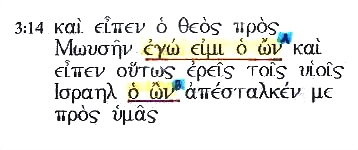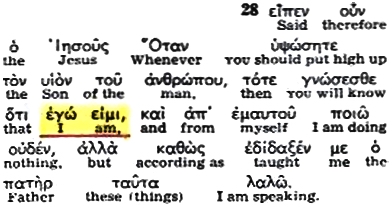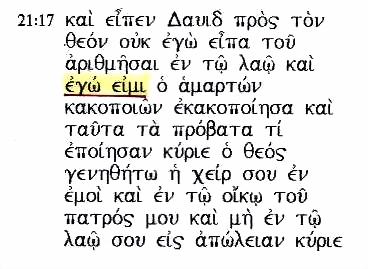We will put our explanation regarding the main issue (I AM) in steps so that it shall be easily followed by those unfamiliar with issues involved.
The focus of the paper is to examine whether the use of the word “I am” in John 8:58 has something to do with “I AM” in Exodus 3:14. We will give the complete verses of John 8:58 and Exodus 3:14 later on in this paper.
A) First, we would like to introduce to the reader the Septuagint, which shall be the main reference in this discussion other than the Bible itself. Let us delve into the explanation about the Septuagint : The word “Septuagint” is taken from the Latin word septuaginta which means “70”. Therefore, this book is also known as “LXX”, which simply means “70”. We wish to refer to The Hutchinson Educational Encyclopedia (HEE) about the Septuagint :
Septuagint n. a Greek version of the Old Testament including the Apocrypha (c.3rd cent. Before Christ), so called because, according to tradition, about 70 persons were employed on the translation. [Latin : septuaginta 70]
Note 1 : The reader may also refer to any other encyclopedia as well as any other Bible dictionary under the same topic, which is “Septuagint”.
From the citation above, we can conclude that)
- 1. Septuagint is a Greek version of the Old Tes)ament.
2. It (Septuagint) has already existed three centuries before Christ was born, and therefore it is authentic.
The question arises, why are we focusing our attention on the LXX in our discussion ?
The answer is because it would make it easier for us to compare the original phrase of the relevant verses (like John 8:58 and Exodus 3:14) in Greek, since both the New Testament and LXX (Septuagint) were written in Greek.
B) In this section, we will make a comparison between the Greek phrase which was used in John 8:58 and Exodus 3:14.
John 8:58 :

Figure 1
“Jesus said unto them, Verily, verily, I say unto you, Before Abraham was, I am.”
Transliteration : Eipen autois Ieesous, ameen ameen legoo humin, prin Abraam genesthai egoo eimi.
Note 2 : In Figure 1 the original Greek word for “I AM” in John 8:58 is ‘egoo eimi’ or in Greek ‘egw eimi’. You can refer this to any of the Greek NT such as The New Testament in the Original Greek by B. F. Westcott and F. J. A. Hort (1881) or from any interlinear Greek/English translation.
Exodus 3:14 :

Figure 2 (refer to Note 4 below)
- And God said unto Moses, I AM THAT I AM : and he said, Thus shalt thou say unto the children of Israel, I AM hath sent me unto you.
Transliteration : Kai eipen ho Theos pros Moouseen Egoo Eimi Ho Oon kai eipen outoos ereis tois uiois Israeel Ho Oon apestalken me pros umas
Note 3 : Please refer to the highlighted words in the Figure 2 above, we have marked ‘A’ for ‘egoo eimi ho oon’ (egw eimi o wn ) , while ‘B’ is for ‘ho oon’ (o wn).
Analysis of ‘B’ Mark
LXX (the last part of Exodus 3:14):
|ho oon = o wn| I AM
|apestalken = apestalken| hath sent me
|metros umas = me proV umaV| unto you.
Compare this with John 8:58 :
John 8:58 :
|prin = prin| before
|Abraam = Abraam| Abraham
|genethai = genesQai| was (or ‘came into being’)
|egoo eimi = egw eimi| I AM.
Observation :
It is clear that the Greek word that has been used by LXX for “I AM” in “I AM hath sent me unto you” (Exodus 3:14) is ‘ho oon’ and not ‘egoo eimi’ as in John 8:58. So they are two different words and have two different meanings, and thus there is no connection between Exodus 3:14 and John 8:58.
‘I Am What I Am’ or ‘I Am The Being’?
Exodus 3:14 (LXX) uses egw eimi o wn (egoo eimi ho oon) which means “I AM THE BEING”, or, “I AM THE EXISTING ONE”. The Greek word ‘oon’ (wn) is translated several times in the New Testament as ‘being’, we refer to :
Luke 3:23 :
And Jesus himself, when he began to teach, was about thirty years of age, being (wn) the son.….
John 7:50 :
Nicodemus saith unto them (he that came to him before, being (wn) one of them)
John 10:33 :
…and because that thou, being (wn) a man, makest thyself God.
So egw eimi o wn (egoo eimi ho oon) should be translated as “I am the being”, and not “I am what I am”. This attempt (evidence of divinity of Jesus Christ) cannot be sustained because the expression in Exodus 3:14 is different from the expression used in John 8:58. This is another proof that throughout the Christian Greek scriptures, God and Jesus(P) are never identified as being the same person.
Note 4 : The Septuaginta that we have used is from A. Rahlfs (Stuttgart : W?rttembergische Bibelanstalt, 1935 ; repr. in 9th ed., 1971), alternatively the reader can get it from http://www.blueletterbible.org
C) From the above conclusion, we know that the expression at John 8:58 is quite different from the one used in Exodus 3:14. That is why the various translators of the New Testament had translated John 8:58 into many ways and had not stick to merely translating it into “I AM”:
- 1869 : “From before Abraham was, I have been.” The New Testament, by G. R. Noyes.
1935 : “I existed before Abraham was born!” The Complete Bible : An American Translation, by J. M. P. Smith and E. J. Goodspeed.
1965 : “Before Abraham was born, I was already the one that I am.” Das Neue Testament, by J?rg Zink.
1981 : “I was alive before Abraham was born!” The Simple English Bible.
1984 : “Before Abraham came into existence, I have been.” New World Translation of the Holy Scriptures.
1999 : “The truth is, I existed before Abraham was even born!” New Living Translation by Tyndale House Publishers, Inc.
This is the same with translations from the ancient New Testament manuscripts :
Fourth/Fifth Century (Syriac-Edition): ?Before Abraham was born, I have been.” A Translation of the Four Gospels From the Syriac of the Sinaitic Palimpsest, by Agnes Smith Lewis, London, 1894.
Fifth Century (Curetonian Syriac-Edition): ?Before ever Abraham come to be, I was.” The Curetonian Version of the Four Gospels, by F. Crawford Burkitt, Vol. 1, Cambridge, England, 1904.
Fifth Century (Syriac Peshitta-Edition): ?Before Abraham existed, I was.” The Syriac New Testament Translated Into English From the Peshitto Version, by James Murdock seventh ed., Boston and London, 1896.
Fifth Century (Georgian-Edition): ?Before ever Abraham come to be, I was.” The Old Georgian Version of the Gospel of John, by Robert P. Blake and Maurice Briere, published in Patrologia Orientalis, Vol. XXVI, fascicle 4, Paris, 1950.
Sixth Century (Ethiopic-Edition): ?Before Abraham was born, I was.” Novum Testamentum Aethiopice (The New Testament in Ethiopic), by Thomas Pell Platt, revised by F. Praetorius, Leipzig, 1899.
Conclusion
The theory of divinity of Jesus through the word “I AM” has not been supported by convincing evidence, so it cannot stand to the scrutiny. Even many of the Gospels as well as the most ancient manuscripts did not use “I AM” in John 8:58, and therefore the word “I AM” in John 8:58 cannot be used as a proof of divinity for Jesus, it is without foundation and a very shaky one at best.
Moreover, existing before existence cannot make somebody to be God. The Bible tell us that not only Jesus was in existence before his time, but also Jeremiah as well :
God said : “I knew you before I formed you in your mother’s womb. Before you were born I set you apart and I appointed you as my spokesmen to the world. (Jeremiah 1:5)
So the verse “Before Abraham was, I am” could not make someone become God (including Jesus), otherwise Jeremiah was also God since he had existed before God had formed him in his mother’s womb. As for the existence of Jesus(P) before his birth, we should remember that Jesus was anointed by God even before he was born (John 17:24). Hence, he was called ‘the Christ’ (Messiah).
We would like to ask the missionary how they would explain this ensuing statement ?
Jesus said to Jews ; “Your father Abraham rejoiced to see my day, and he saw it, and was glad. (John 8:56)
So, is Abraham(P) also God since he can see something in the future or something in advance ? Of course not, and the same goes for Jesus(P).
“I AM .….”
or

On the use of the words “I AM” by Jesus as in :
- “I AM” the Way, the Truth and the Life
“I AM” the Door
“I AM” the Light of the World
“I AM” the Good Shepherd
“I AM” the Bread of Life
“I AM” the Resurrection and the Life
“I AM” the True Vine
“I AM” the Alpha and Omega
“I AM” the Almighty God
“I AM” the First and the Last
“I AM” He who searches the Minds and Hearts
“I AM” Coming Quickly
“I AM” the Root and Offspring of David
“I AM” Giver of the Living Water
or the reader can refer to the missionary argument here.
Our Response
1st Point
We wonder why the missionary had left out the following “I AM” verse :
Then said Jesus unto them, When ye have lifted up the Son of man, then shall ye know that I am he, and that I do nothing of myself ; but as my Father hath taught me, I speak these things. (John 8:28)
This verse says that Jesus(P) himself could not do anything, so if he was God does it mean that God could not do anything ?
Let us analyse the Greek equivalent of the phrase used by Jesus(P) in the above verse :

Figure 3
We can see that the Greek word used by Jesus(P) in John 8:28 is also ‘egw eimi’ or “I am”. So again the use of “I am” cannot prove that Jesus was God, otherwise he was a weak God who had limitations.
2nd Point
If the missionary still believes that the use of the phrase “I am” makes Jesus God, they should also take David as God since David(P) was also using this “I am”:
And David said to God, “Was it not I who commanded the people to be numbered ? I am the one who has sinned and done evil indeed ; but these sheep, what have they done ? Let Your hand, I pray, O LORD my God, be against me and my father’s house, but not against Your people that they should be plagued. NKJV (1 Chron. 21:17)
So we see here that David(P) had also used the word “I am”. To be sure, let us see in the LXX for the equivalent Greek word that he had used in 1 Chron. 21:17 :

Figure 4
Clearly, it is “egw eimi” or “I am”, so do these words make David God ? If the answer is no, what evidence can the missionary show that makes Jesus God, simply by using the phrase, “I am”?
3rd Point
It is clear that saying “I am” is not evidence that the person is God. When the Jews were doubtful about the identity of a particular blind beggar who had been healed by Jesus, the blind beggar — who was no more blind, kept saying ; “I am (he)” (John 9:9, KJV), please refer to Figure 5 below :

Figure 5
Does “I am” or “Egw eimi” make the blind beggar God ? Of course not ! The same applies for Jesus(P).
It is interesting to note that the referred beggar, when questioned about Jesus who had healed him, replied to Jews as follows :
And he said, “He is a prophet”. (John 9:17)
This is no doubt in accordance with what Qur’?n has said :
“Christ the son of Mary was no more than an Apostle ; many were the Apostles that passed away before him…” (Qur’?n, 5:75)
In short, everyone at the time of Jesus knew that he was only a prophet and not God.
4th Point
Many Christians have misunderstood about the saying “I AM the Alpha and Omega” in the book of Revelation 1:8. They believe that these were the words of Jesus, when this is actually not true, because it was said by the Lord God and not Jesus himself. The New American Bible has proven this :

Figure 6
Figure 6 is showing the passage from the book of Revelation, verse 8. So Jesus(P) never claimed to be “the Alpha and Omega” at all, rather that was said by Lord God Himself — please refer to the underlined words in red in Figure 6 above. Almost all the versions have supported this point, please refer to New Revised Standard Version, The Amplified Bible, The New Jerusalem Bible, New International Version and New American Standard Version.
The source of misunderstanding for this verse by Christians is actually due to the King James Version (KJV) which has wrongly translated the Greek words “legei kurios ho Theos” or in Greek “legei kurioV o QeoV”. The KJV only translated “legei kurios” or “says the lord” and left out “ho Theos” which means “the God”, this can be easily be understood by referring to Figure 7 below :

Figure 7 (refer to Note 5 below)
So it is obvious that the KJV had thrown out “The God” and had only considered “says the Lord” or “says the Master” that implies that it being Jesus, and this is incorrect. Please be informed that the Greek word “kurios” can be translated as either “lord” or “master”. So the correct translation for these Greek words is given by the New American Bible as in Figure 6 above.
Note 5 : The image in Figure 7 is taken from ‘Word Study Greek-English New Testament” by Paul R. McReynolds, Tyndale House Publishers, Inc. Wheaton, Illinois, 1998.
In short, we have given the facts which is supported by visual proofs to show that the words “I am” cannot make Jesus(P) as God, and the idea does not stand to the scrutiny, as the missionaries would like us to believe. 

